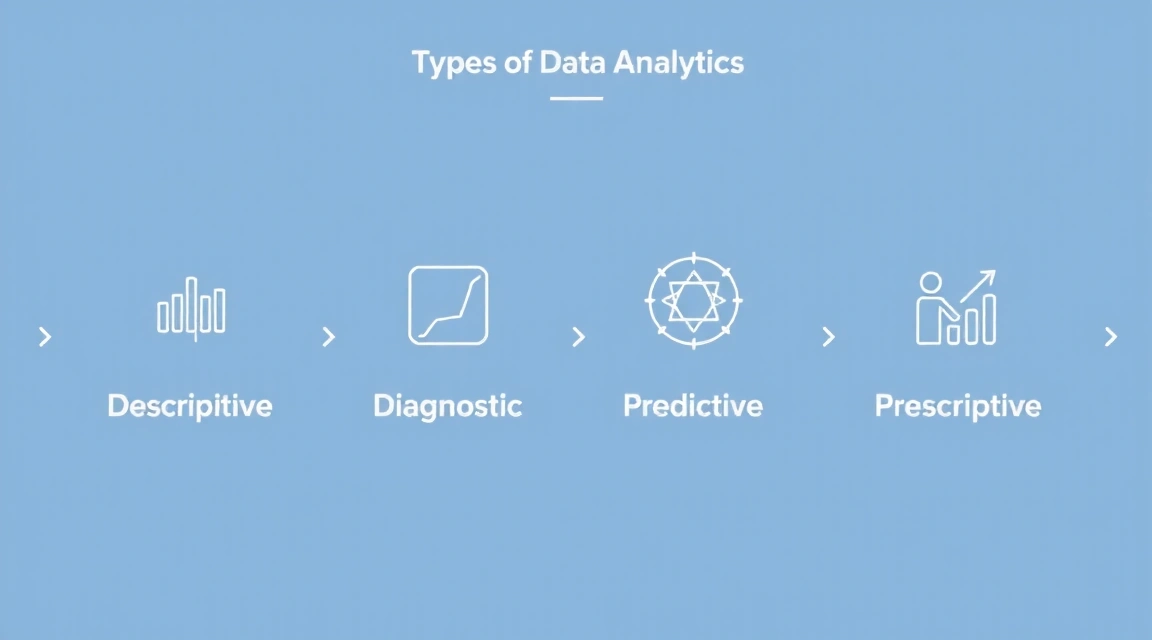The Transformative Power of Data Analytics in Modern Business
In today's hyper-competitive and data-rich landscape, businesses are constantly seeking an edge. The ability to harness, analyze, and interpret vast quantities of data has emerged as a critical differentiator, transforming how companies operate, strategize, and engage with their customers. Data analytics is no longer just a buzzword; it's the backbone of intelligent decision-making and sustainable growth.

At its core, data analytics involves the process of examining raw data to uncover hidden patterns, correlations, and insights. These insights are then used to inform and improve business decisions, ranging from operational efficiencies to strategic market positioning. The journey from raw data to actionable intelligence is multifaceted, encompassing various techniques and technologies.
Understanding the Core Pillars of Data Analytics
Data analytics can be broadly categorized into several key types, each serving a distinct purpose in the decision-making process:
- Descriptive Analytics: This answers the question, "What happened?" It focuses on summarizing past data to describe outcomes. Examples include monthly sales reports, customer demographics, and website traffic statistics. It provides a foundational understanding of business performance.
- Diagnostic Analytics: Moving beyond just knowing what happened, diagnostic analytics asks, "Why did it happen?" It delves into the data to explore root causes of events. Techniques like drill-down, data discovery, and data mining are often employed here to pinpoint contributing factors.
- Predictive Analytics: This type of analytics aims to answer, "What will happen?" By leveraging historical data and statistical models, predictive analytics forecasts future trends and probabilities. This is crucial for demand forecasting, risk assessment, and identifying potential customer churn.
- Prescriptive Analytics: The most advanced form, prescriptive analytics tackles the question, "What should we do?" It not only predicts future outcomes but also suggests actions to take, and the potential implications of each decision. This often involves optimization and simulation techniques to guide businesses toward optimal solutions.

The Tangible Benefits for Modern Enterprises
The application of data analytics brings a wealth of benefits across various business functions:
Enhanced Decision-Making
One of the most immediate and impactful benefits is the shift from intuition-based decisions to data-driven strategies. With analytics, leaders can make informed choices based on empirical evidence, reducing risk and increasing the likelihood of successful outcomes.
Improved Customer Understanding
By analyzing customer data – including purchase history, browsing behavior, and feedback – businesses can gain deep insights into preferences, needs, and pain points. This enables personalized marketing campaigns, tailored product offerings, and superior customer service, ultimately fostering stronger customer loyalty.
Operational Efficiencies
Data analytics can identify bottlenecks, inefficiencies, and areas for optimization within operational processes. From supply chain management to manufacturing workflows, analytics helps streamline operations, reduce waste, and cut costs.
Risk Management and Fraud Detection
In financial services and other sectors, analytics plays a crucial role in identifying anomalies and patterns indicative of fraud. It also assists in assessing and mitigating various business risks, from market volatility to cybersecurity threats.
Innovation and New Product Development
By understanding market trends and unmet customer needs through data analysis, companies can innovate more effectively. Analytics can guide the development of new products and services that resonate with the target audience, ensuring a higher success rate upon launch.
"Data is the new oil. It's valuable, but if unrefined, it cannot really be used. It has to be changed into gas, plastic, chemicals, etc., to create a valuable entity that drives profitable activity; so must data be broken down, analyzed for it to have value."
Challenges and the Path Forward
Despite its immense potential, implementing a robust data analytics strategy comes with its own set of challenges. These include data quality issues, the need for skilled data scientists, integrating disparate data sources, and ensuring data privacy and security compliance.
However, the rapid advancements in artificial intelligence, machine learning, and cloud computing are continuously making data analytics more accessible and powerful. Tools and platforms are becoming more user-friendly, allowing businesses of all sizes to leverage the power of their data.
For organizations looking to thrive in the digital age, investing in data analytics capabilities is not just an option, but a necessity. It empowers them to anticipate market shifts, delight customers, optimize operations, and ultimately, achieve sustainable competitive advantage.
Ready to unlock the full potential of your data? Explore our Services or Contact Us to learn how we can help you transform your business with cutting-edge analytics solutions.